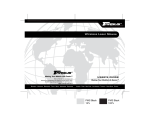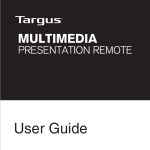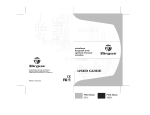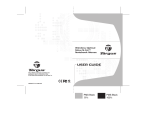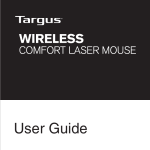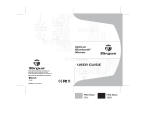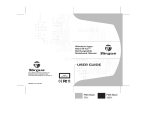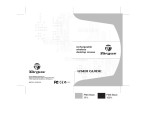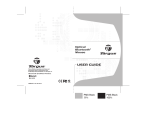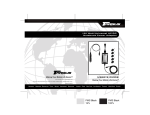Download Targus 410-0008-001A User's Manual
Transcript
wireless laser rechargeable notebook mouse USER GUIDE Visit our Website at www.targus.com Features and specifications are subject to change without notice. ©2006 Targus Group International, Inc. and Targus, Inc. AMW15US / 410-0008-001A AMW15US-10.book Page 2 Sunday, November 6, 2005 12:17 AM Table of Contents Introduction ..........................................3 Package Contents ................................3 System Requirements ..........................4 Connecting the Mouse Receiver ..........4 Installing the Batteries ..........................4 Charging the Batteries .........................6 Synchronization ....................................7 Mouse Power Management .................8 Safety Measures ..................................8 Operating Hints ....................................8 Troubleshooting ...................................9 Technical Support ..............................11 Product Registration ...........................11 Warranty .............................................11 Regulatory Compliance ......................12 2 TARGUS WIRELESS LASER RECHARGEABLE NOTEBOOK MOUSE Introduction Congratulations on your purchase of a Targus Wireless Laser Rechargeable Notebook Mouse. This compact mini mouse incorporates new laser tracking technology, offering 20 times more sensitivity than a traditional LED optical mouse. The images the laser receives are more detailed, with higher contrast. The mouse can track more reliably, even on reflective surfaces, and its small footprint makes it ideal for portable computing. NOTE: WHILE THE MOUSE IS FUNCTIONING, NO LASER LIGHT IS VISIBLE TO THE BE CAREFUL NOT TO LOOK DIRECTLY INTO THE EMITTER HOLE WHILE THE MOUSE IS ACTIVE. NAKED EYE. Package Contents Wireless Laser Mouse USB receiver USB charge cable USB extension cable 2 AAA rechargeable batteries Carrying pouch 3 Targus Wireless Laser Rechargeable Notebook Mouse System Requirements Hardware • USB port Operating System • Windows® 98SE/ME/2000/XP or Mac OS X and above Connecting Receiver the Mouse To connect the mouse receiver: 1 Plug the USB receiver into an available USB port on your computer. 2 Your computer’s operating system identifies the receiver and begins installing the default driver. If applicable, follow any on-screen procedures to complete the native driver installation. Installing the Batteries 1 If the mouse is on, slide the on/off switch on the bottom of the mouse to the “off” position. 4 Targus Wireless Laser Rechargeable Notebook Mouse 2 Remove the battery cover from the top of the mouse by pressing the battery cover hinge located on the bottom of the mouse and sliding it off. On/Off switch Connect button Laser Battery cover hinge Mouse Bottom NOTE: THE BATTERY COVER IS ALSO THE TOP COVER OF THE MOUSE. 5 Targus Wireless Laser Rechargeable Notebook Mouse 3 Insert the supplied batteries, making sure that the positive (+) and negative (-) ends of each battery match the polarity indicators inside the battery housing. WARNING: WHEN REPLACING THE BATTERIES, USE ONLY HEAVY-DUTY NIMH RECHARGEABLE BATTERIES. NEVER USE ALKALINE BATTERIES. AVOID MIXING NEW AND USED BATTERIES IN A DEVICE. 4 Slide the battery cover back into position until it “clicks” firmly into place. 5 Turn on the mouse by sliding the on/off switch on the bottom of the mouse to the “on” position. NOTE: WHILE THE MOUSE IS FUNCTIONING, NO LASER LIGHT IS VISIBLE TO THE BE CAREFUL NOT TO LOOK DIRECTLY INTO THE EMITTER HOLE WHILE THE MOUSE IS ACTIVE. NAKED EYE. Charging the Batteries For best results, you should charge the mouse at least 4 hours before using it. You can do this via the supplied USB charge cable. To do this: 1 Connect the cable’s USB connector into an available USB port on your computer. 2 Connect the other end to the mouse. NOTE: TO CONTINUOUSLY CHARGE THE MOUSE VIA THE USB CHARGE CABLE, YOUR COMPUTER MUST BE ON AND AWAKE. FOR BEST RESULTS, TURN OFF YOUR COMPUTER’S POWER MANAGEMENT FEATURE WHILE CHARGING THE MOUSE. 6 Targus Wireless Laser Rechargeable Notebook Mouse Synchronization After your computer detects the USB receiver you must establish a communications link between the mouse and its receiver BEFORE you can use the mouse. To do this, follow the instructions below: 1 Press and release the connect button located at the bottom of the receiver. Connect button Receiver The receiver’s status light blinks when the receiver is activated. 2 Press and release the connect button, located on the bottom of the mouse. You are now ready to use the mouse. NOTE: DUE TO THE IMPROVED TRACKING SPEED OF THE LASER ENGINE, USERS MAY FIND THE CURSOR MOVEMENT IS FASTER THAN A CONVENTIONAL OPTICAL MOUSE. CURSOR CONTROL PANEL. SETTINGS CAN BE CHANGED FROM YOUR COMPUTER’S 7 Targus Wireless Laser Rechargeable Notebook Mouse Mouse Power Management • To power the mouse on and off, slide the on/off switch at the bottom of the mouse to the desired position. • When power is on, the mouse goes into "sleep mode" after 8 minutes of non-use. To activate the mouse, press any mouse button. Safety Measures • Although this mouse is a Class 1 Laser Product and safe for operation, avoid pointing the laser into the eyes or looking directly into the laser emitter. • Keep the mouse away from young children. • Any attempt to disassemble, adjust or repair the mouse may result in exposure to laser light or other safety hazards. Operating Hints For optimal performance and RF reception: • Place the receiver at least 8 inches (20 cm) away from all electrical devices, such as your monitor, speakers or external storage devices. If necessary, use the supplied extension cable to keep the receiver away from the computer. Plug the receiver into the extension cable, and the extension cable to the computer. 8 Targus Wireless Laser Rechargeable Notebook Mouse • Avoid using the mouse on a metal surface. Metals, such as iron, aluminum or copper, shield the radio frequency transmission and may slow down the mouse’s response time or cause the mouse to fail temporarily. • The mouse will enter a suspend mode at the same time your computer does. To activate the mouse press any mouse button. • If your computer has a metal case that contains aluminum or magnesium, use the mouse to the side. The display panel may interfere with the radio frequency signal if you use the mouse directly in front of the computer. Troubleshooting What do I do if the mouse does not work? • Make sure that the polarity of the batteries is correct. The positive (+) and negative (-) ends of each battery must match the positive (+) and negative (-) connections in the battery housing. • Make sure that the batteries are fully charged. Check your computer’s suspend mode settings, as the mouse will not charge while the computer is in suspend mode. • Check that the receiver's USB connector is firmly attached to the USB port on your computer. • Make sure you have established a wireless link between the mouse and its receiver. See “Synchronization” on page 7. 9 Targus Wireless Laser Rechargeable Notebook Mouse I do not see the laser light when the mouse is active. • Unlike traditional optical mice, the light is not visible when the laser mouse is active. • To make sure the mouse is on and functioning properly, move the mouse back and forth and check to see if the cursor responds. My mouse does not work on a mirror or glass surface. • Though rated for most of these kinds of surfaces, occasionally there will be one such surface that will cause the mouse to work improperly or not at all. • If you are using the mouse on a reflective or mirrored surface, move it to another surface. What do I do if the response time of the mouse is slow or the mouse intermittently stops working? • Metals, such as iron, aluminum or copper may slow down the mouse's response time or cause the mouse to fail temporarily. • If you are using the mouse on a metal surface, move it and the receiver to a non-metal surface. 10 Targus Wireless Laser Rechargeable Notebook Mouse Technical Support For technical questions, please visit: US Internet: http://www.targus.com/support Australia Internet: www.targus.com/au Email: [email protected] Telephone: 1800-641-645 New Zealand Telephone: 0800-633-222 Product Registration Targus recommends that you register your Targus accessory shortly after purchasing it. To register your Targus accessory, go to: http://www.targus.com/registration.asp You will need to provide your full name, email address, phone number, and company information (if applicable). Warranty Targus warrants this product to be free from defects in materials and workmanship for one year. If your Targus accessory is found to be defective within that time, we will promptly repair or replace it. This warranty does not cover accidental damage, wear and tear, or consequential or incidental loss. Under no conditions is Targus liable for loss of, or damage to a computer; nor loss of, or damage to, programs, records, or data; nor any consequential or incidental damages, even if Targus has been informed of their possibility. This warranty does not affect your statutory rights. 11 Targus Wireless Laser Rechargeable Notebook Mouse Regulatory Compliance This device complies with Part 15 of the FCC Rules. Operation is subject to the following two conditions: (1) This device may not cause harmful interference, and (2) This device must accept any interference received, including interference that may cause undesired operation. FCC Statement Tested to Comply This equipment has been tested and found to comply with the limits of a Class B digital device, pursuant to Part 15 of the FCC Rules. These limits are designed to provide reasonable protection against harmful interference in a residential installation. This equipment generates, uses, and can radiate radio frequency energy and if not installed and used in accordance with the instructions, may cause harmful interference to radio communications. However, there is no guarantee that interference will not occur in a particular installation. If this equipment does cause harmful interference to radio or television reception, which can be determined by turning the equipment off and on, the user is encouraged to try to correct the interference by one or more of the following measures: • Reorient or relocate the receiving antenna; • Increase the separation between the equipment and receiver; • Connect the equipment into an outlet on a circuit different from that to which the receiver is connected; • Consult the dealer or experienced radio/TV technician for help. Windows is a registered trademark of Microsoft Corporation. All trademarks and registered trademarks are the property of their respective owners. Features and specifications subject to change without notice. © 2006, Targus Group International, Inc. and Targus, Inc., Anaheim, CA 92806 USA. 12












